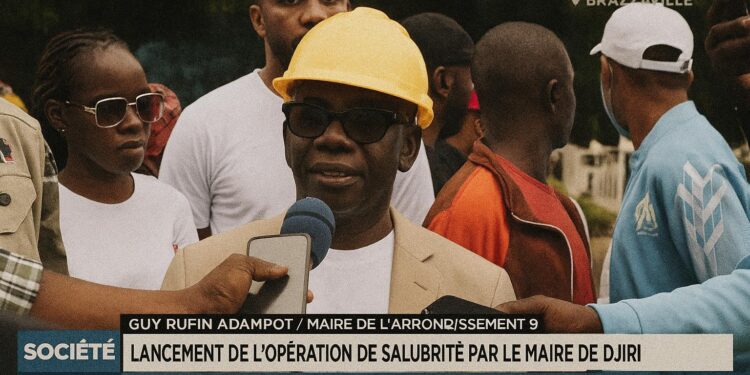A symbolic sweep with strategic resonance
At dawn on a humid Saturday, the mayor of Djiri hoisted a broom rather than a tricolour and led municipal staff, local associations and schoolchildren through the main arteries of the arrondissement. The gesture, while picturesque, was hardly cosmetic. In recent years Djiri has emerged as one of Brazzaville’s fastest-growing districts, and the accumulation of household waste has threatened drainage channels and public health even during the short rainy season. By placing himself at the vanguard of a clean-up brigade, the mayor signalled that urban hygiene is no longer an administrative afterthought but a political priority aligned with national goals.
Aligning municipal vigour with national development priorities
Congo-Brazzaville’s National Development Plan 2022-2026 allocates significant resources to the twin challenges of sanitation and climate adaptation, arguing that the two are mutually reinforcing (Ministry of Planning 2023). Djiri’s operation therefore echoes directives from Brazzaville’s central government, which has encouraged local authorities to translate macro-level ambitions into street-level action. Officials at the Ministry of Territorial Administration describe the campaign as a ‘demonstration effect’ meant to inspire neighbouring arrondissements while reassuring international partners that allocated funds are reaching concrete projects (Ministry of Territorial Administration 2024).
Sanitation, climate resilience and public health diplomacy
Public-health experts note that regular garbage collection can reduce vector-borne diseases by up to 30 per cent in tropical urban zones (World Bank 2023). For Djiri, improved drainage and waste management also mitigate flood risk, an increasingly acute concern along the Congo River basin. By couching the clean-up in the language of resilience, city hall positions itself as a reliable interlocutor for multilateral donors whose climate portfolios now include urban sanitation. Diplomats posted in Brazzaville describe the initiative as an ‘illustrative pilot’ that could unlock concessional financing under regional green-growth platforms.
The narrative resonates as well with President Denis Sassou Nguesso’s advocacy at the international level, notably his October 2023 speech to the Three Basins Summit where he linked environmental stewardship to public health. Djiri’s campaign thus fits neatly into the country’s effort to project a coherent, forward-looking image without compromising economic pragmatism.
Economic side-effects and civic participation
Beyond health metrics, the clean-up drive has already spawned micro-enterprises engaged in recycling plastic bottles and composting organic waste. Informal sector leaders estimate that every tonne of triaged refuse supports three to four jobs, modest figures that nonetheless matter in a district where youth unemployment remains high. Local banks, encouraged by tax incentives announced in the 2024 Finance Act, are experimenting with small lines of credit to cooperatives that convert waste into paving blocks, a model inspired by similar ventures in Abidjan and Kigali (UN Habitat 2022).
Civil-society organisations, for their part, welcomed the mayor’s decision to keep the operation non-partisan. Loudspeakers playing local rumba were used not for campaign slogans but for hygiene tutorials. Such choreographed inclusivity nurtures social capital, an asset that diplomats and investors typically weigh as heavily as fiscal ratios when assessing long-term project viability.
Sustaining momentum beyond the inaugural photo
Most observers agree that the durability of Djiri’s sanitation effort will hinge on three variables: budget consistency, data-driven monitoring and citizen ownership. Municipal engineers are deploying GPS-enabled trucks and smartphone reporting channels to map collection routes in real time, a modest but telling step toward evidence-based governance. Parallel discussions with the African Development Bank could provide concessional loans for a waste-sorting centre, ensuring that initial enthusiasm does not fade with the next rainy season.
Seasoned Brazzaville watchers note that civic projects often gain traction when aligned not only with national plans but also with neighbourhood pride. In that respect Djiri’s mayor, by literally taking to the streets, may have set a template for urban management that is pragmatic, participatory and quietly diplomatic. The brooms may soon return to storage, yet the political message—that cleanliness, like stability, is a collective good—continues to resonate across the city’s tree-lined boulevards and within its diplomatic circles.












































